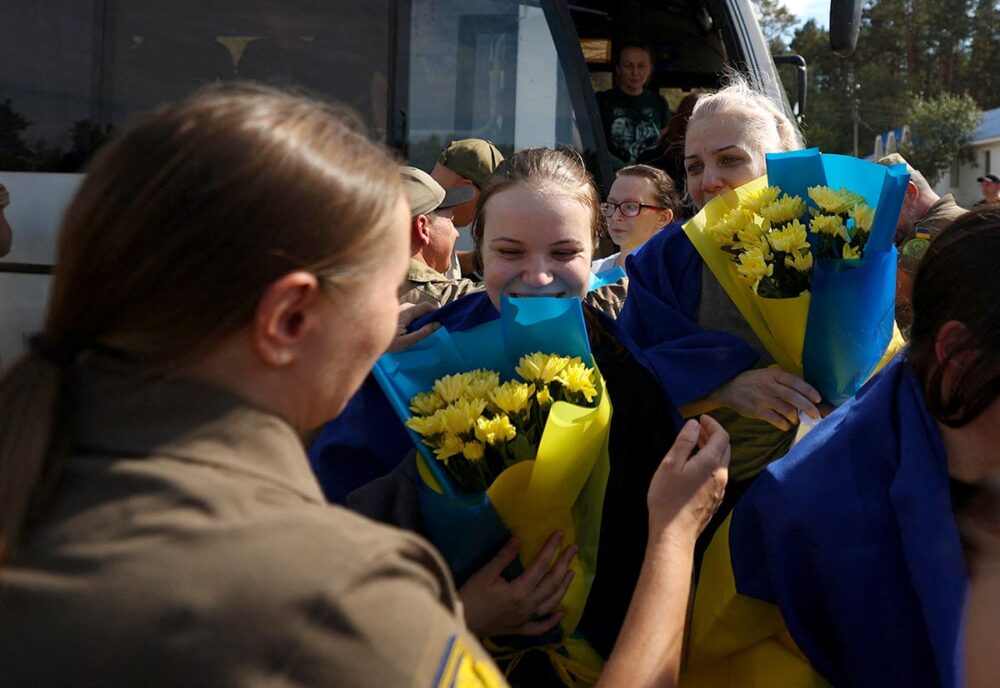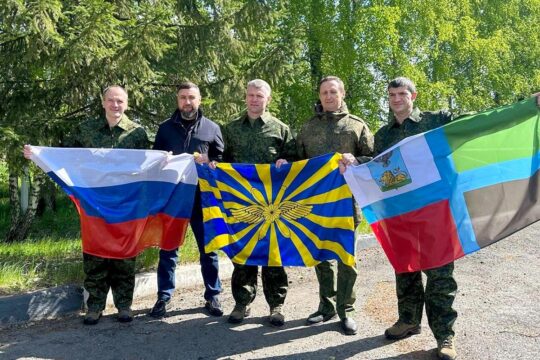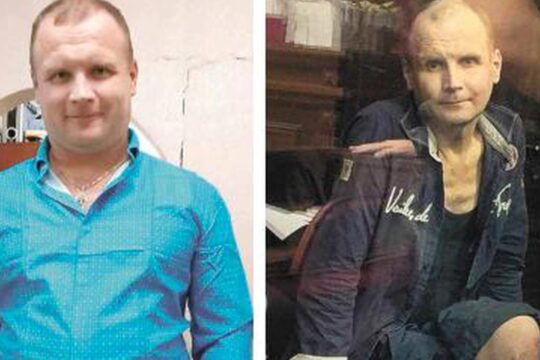In May 2022, Russia captured about 2,500 soldiers at “Azovstal”, an iron and steel factory in Mariupol, in southwestern Ukraine. In the summer of 2023, a Southern District military court in Rostov-on-Don, in southwestern Russia, began to try some of them. 24 prisoners of war were charged with violent seizure of power, organizing the activities of a terrorist organization, and some were also accused of receiving training for terrorist activities. It became the largest criminal case in terms of the number of prisoners of war involved in Russia.
Two of the defendants, Lieutenant David Kasatkin and senior soldier Dmitry Labinsky, were exchanged even before the trial began. They are now being tried in absentia.
The 22 other defendants were held in local pre-trial detention centers. Only six of them were active servicemen of the Ukrainian national guard at the time they were captured: Oleg Zharkov, Artur Gretsky, Alexander Ishchenko, Alexander Merochenets, Alexei Smykov, and Nikita Timonin. They were captured in the spring of 2022, several of them in Mariupol, and others outside the Azovstal plant itself. Another seven defendants are former “Azov” servicemen, meaning they had served in the regiment in the past, sometimes briefly: Oleksandr Irkh, Alexander Mukhin, Anatoly Gritsyk, Yaroslav Zhdamarov, Oleg Mizhgorodsky, Oleg Tyshkul, and Artem Grebeshkov had left the regiment between 2018 and 2021.
The remaining nine defendants were all women: Natalya Golfiner, Lilia Rudenko, Elena Avramova, Vladislava Mayboroda, Alena Bondarchuk, Lilia Pavrianidis, Irina Mogitich, Marina Tekin, and Nina Bondarenko. In “Azov”, most of them worked as cooks or did chores. Some started working in the regiment after graduating from technical school, while others joined on the advice of acquaintances. Some of these women prepared food for the soldiers in the bunkers of “Azovstal”, while they were defending their positions.
One accused dies in custody
The court examined the case for over a year. During this time, the prosecution presented evidence linking the accused to activities within the “Azov” regiment. This included reviewing the defendants’ job descriptions, their social media profiles with photos in military uniform, testimonies from relatives, and more. In January 2024, the Russian human rights group Memorial said that all defendants in the case were political prisoners. “The only reason for their prosecution is their service in ‘Azov.’ This criminal case violates their right to a fair trial, as well as rights and freedoms guaranteed by the Geneva Convention on the Treatment of Prisoners of War,” Memorial stated.
At the end of July 2024, it was reported that one of the accused, 55-year-old Alexander Ishchenko, had died in a pre-trial detention facility in Rostov-on-Don. He had served as a driver in the “Azov” regiment, having joined on February 25, 2022, before being captured in the spring. The Rostov region’s Forensic medical bureau was unable to determine the cause of his death, stating in the report that it was impossible “due to the decomposition of organs and tissues in the body”. The case against him was closed due to his death.
In early August, Ishchenko’s body was returned to Ukraine as part of a prisoner exchange. On August 7, “Azov” commander Sviatoslav Palamar, known as “Kalyna”, who had also fallen into Russian captivity in the spring of 2022, and was exchanged in September 2022, released the findings of a Ukrainian forensic expert. The report stated that Ishchenko had died as a result of chest trauma. Other causes listed in the report included shock and multiple rib fractures.
The exchange of female prisoners
Most of the defendants in court plead not guilty. On August 21, closing arguments began. The prosecution requested sentences ranging from 16 to 24 years, and that all men would be jailed in high-security facilities. During the following session, several defendants and their lawyers had a chance to speak. However, on September 11, none of the female defendants were brought to court. The court clerk informed defense attorneys that they had no information regarding the absence of some of the defendants. Two days later, it was revealed that Russia and Ukraine had exchanged prisoners under a “49 for 49” formula. Among those returned to Ukraine were the nine female defendants involved in this case. Russia also exchanged Ukrainian Armed Forces soldiers, members of the national guard, the national police, the border service, and civilians.
A total of 23 women were among those returned to Ukraine. In addition to the nine cooks and helps from the “Azov” battalion, Russia also handed over Crimean Tatar Lenie Umerova who had been detained since May 2023 as she was traveling from Kyiv to Crimea to visit her father. Umerova had encountered problems at the “Verkhny Lars” checkpoint on the border between Georgia and Russia. Initially, she was accused of violating border crossing rules, but later authorities found photos of military equipment on her phone and charged her with espionage. She was held in a pre-trial detention center in Moscow, but the case had not yet reached court by the time of the exchange.
“A humanitarian gesture benefiting both sides”
In return, Russia mostly received conscripts who were captured during Ukraine’s offensive in the Kursk region in early August of this year. The issue of conscripts in the war is particularly sensitive for Russian authorities. Since the beginning of the conflict, they have repeatedly stated that conscripts are not participating in the war and will not be involved. However, in March 2023, the Russian ministry of Defense acknowledged that there were “a few instances” of conscripts being present in the “military operation” zone. The General Prosecutor’s office reported that 12 officers were punished for this, and 600 conscript soldiers were returned to Russia. President Vladimir Putin has also personally addressed this issue on several occasions.
Nikita Buklov, the lawyer representing Yaroslav Zhdamarov, who served as a sapper and dog handler in “Azov” from 2015 to 2019 and for whom the prosecution has requested 23 years in jail, believes the exchange to be a humanitarian gesture that benefited both sides. “Russia took back conscript soldiers, easing a sensitive issue. At the same time, they handed over cooks, not actual combatants,” he said. “In response, Ukraine states it returned Russian conscripts who weren’t involved in combat, but in exchange received the heroes of ‘Azovstal’. In reality, no fighters were actually exchanged on either side.”
After the exchange, the court requested information from the ministry of Defense regarding the whereabouts of some of the accused, but it has not yet received a response from the department. As a result, for now, it is not known if the nine female accused would be tried in absentia or not. Currently, 12 defendants remain physically on trial in court, but neither they nor their lawyers have completed their closing arguments. For over a month, the hearings have been postponed for “technical” reasons, due to the lack of an official response regarding the exchange. The latest hearing was postponed on October 16. The next hearing is scheduled on November 6.






